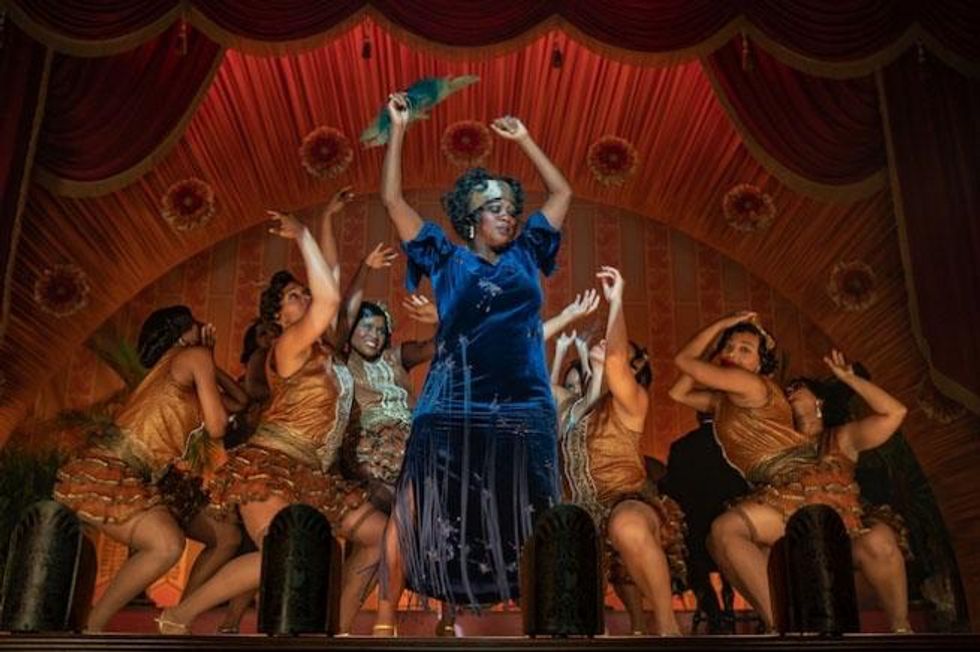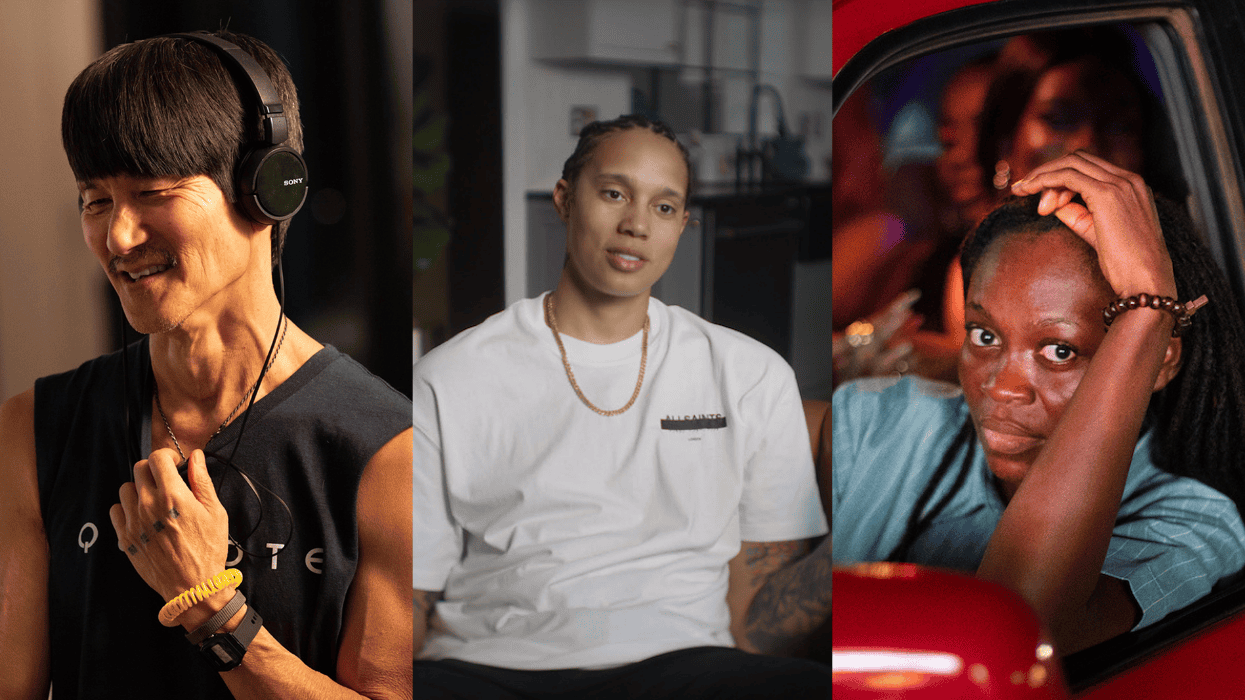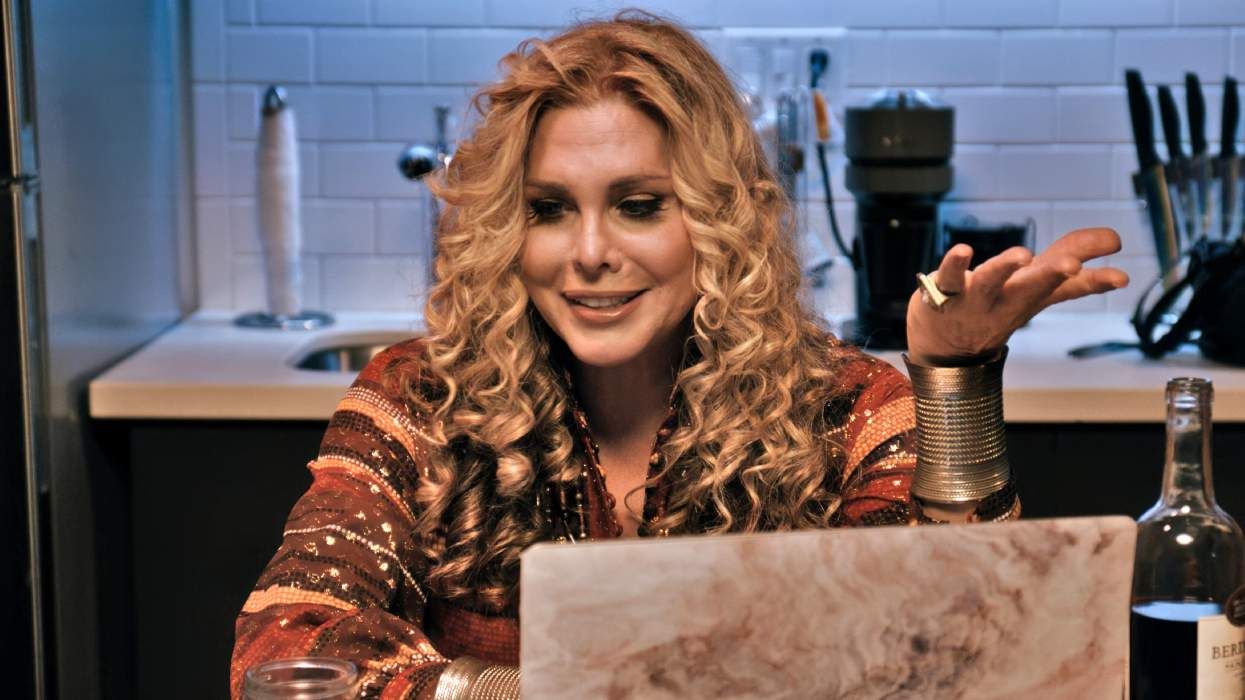The Best LGBTQ+ Films of 2020

It has been a strange year for the movies. With the exception of drive-in locations, the pandemic caused nearly all theaters to shutter around the world, perhaps forever changing the way people experience films.
In that vein, streaming platforms have become the new cineplex. And many of the films screened first in our living rooms were not only excellent but also featured stellar LGBTQ+ stories and characters -- many in surprising genres.
Below, review some of The Advocate's editors' favorites comedies, dramas, and dramedies from 2020. Leave your own beloved productions in the comments.
Unpregnant

Unpregnant is a joyous coming-of-age road trip flick about two teenage girls in the Midwest. But it is also a surprising showcase of a decades-old relationship of two interconnected social movements: a woman's right to choose and LGBTQ+ equality.
In the HBO Max comedy, Veronica (Haley Lu Richardson) learns she is pregnant. The 17-year-old wants to have an abortion, but unfortunately for her, she lives in Missouri, which forbids minors to have one without parental permission. Her only option is to drive to a clinic in Albuquerque, N.M. -- and the only person who can help her reach this destination is Bailey (Barbie Ferreira), a former best friend who happens to be queer.
For channeling the spirit of Booksmart and being unafraid of tackling political issues in a genre that is unexpected, Unpregnant established itself as one of the year's standout films, LGBTQ+ or otherwise.
Uncle Frank

Written and directed by Six Feet Under and True Blood creator Alan Ball, Uncle Frank, set in 1973, follows teenager Beth Bledsoe (Sophia Lillis) as she departs her rural Southern town to study at New York University, where her Uncle Frank (Paul Bettany) teaches literature. Beth soon learns that Frank is gay and living with his partner, Walid "Wally" Nadeem (Peter Macdissi). Afterward, a death in the family forces the trio to take a road trip back home and confront past trauma.
Although set in the past, Uncle Frank touches on issues that still reverberate in society, including the fear of losing family after one comes out. The film is a moving ode to this rite of passage and a beautiful story of the power of family and found family to help one survive.
The Old Guard

The Charlize Theron starrer based on Greg Rucka's graphic novel about immortal warriors who use their powers for good has resonated with audiences and became number 1 on Netflix in July. In it, Theron plays the eldest of the warriors, Andromache of Scythia, or Andy for short. World-weary and exhausted from fighting the same types of ethical battles for centuries with little to no change, Andy is wary of her immortality when a new member of the Old Guard is discovered in Nile (KiKi Layne), a marine based in Afghanistan who miraculously recovers from having her throat slit.
The group of warriors seeking to change the world for the better includes Booker (Matthias Schoenaerts), a French soldier who fought under Napoleon; Joe (Marwan Kenzari), a Muslim warrior from the Crusades; and Nicky (Luca Marinelli), a Christian soldier in the Crusades who becomes Joe's one true love for several hundred years.
The groundbreaking action flick not only depicts love between men, but there's also a woman from Andy's past with whom she shared a deep connection, although the nature of their relationship was not completely unpacked in the film, which has rumors of a sequel. Not incidentally, however, Andy appears to transcend gender, at least in this century.
The Half of It

In early May, Netflix released The Half of It, in which high school student Ellie Chu (Leah Lewis) is renowned for her prowess with the pen -- at least in terms of writing her classmates' papers for them as a side gig. But when sweet football jock Paul (Daniel Diemer) propositions her to craft a letter to his crush, Aster (Alexxis Lemire), Ellie soon discovers how deep her crush on the object of his affection goes. Meanwhile, when Ellie's not spending her free time watching classic Hollywood cinema with her father and minding the train that comes through the station outside their house, she and Paul navigate the nuances of their unlikely friendship.
The film is a modern take on the playwright Edmond Rostand's Cyrano de Bergerac, but it's also culled from director Alice Wu's friendship with a straight male best friend who helped her come to terms with her gay identity and the emotional intimacy they shared.
The movie is Wu's return to filmmaking after about 15 years. Her beloved first feature, 2004's Saving Face, explored the intersections of Chinese-American and lesbian identities. The Half of It is a funny and poignant ode to love and intimacy of various kinds.
The Boys in the Band

The latest iteration of Mart Crowley's landmark work The Boys in the Band is the Netflix film produced by Ryan Murphy and helmed by legendary theater director Joe Mantello, who directed the 2018 Broadway production that famously starred a cast of only out queer men. Since he wrote it in 1968, Crowley's text has been examined and recontextualized in terms of its depiction of gay life, and not just by the actors who've stepped into the roles Crowley (who died earlier this year) created. But as visualized by Murphy and starring Jim Parsons, Matt Bomer, Robin de Jesus, Michael Benjamin Washington, Andrew Rannells, Tuc Watkins, Brian Hutchison, and Charlie Carver, the film that premiered on Netflix this fall reframed the story for 2020, highlighting the resilience and strength of its characters.
Ma Rainey's Black Bottom

As one of its final originals of the year, Netflix drops Ma Rainey's Black Bottom, based on August Wilson's play, on December 18. With Oscar and Emmy winner Viola Davis as the queer blues legend Ma Rainey and Black Panther star Chadwick Boseman in his final role as the horn player Levee, the film, directed by theater legend George C. Wolfe, is the perfect story in a year when the long-overdue conversation about systemic racism came to light.
While the film is based on the real-life Rainey, it is a work of fiction that explores the Great Migration when Black people left the South for the North. Rainey was renowned for her sexually free songs that include the bisexual anthem "Prove It on Me Blues." Ruben Santiago-Hudson (Lackawanna Blues) wrote the screenplay for the movie, which also stars Taylour Paige as Ma's girlfriend Dussie Mae, Michael Potts, Colman Domingo, Glynn Turman, Dusan Brown, Johnny Coyne, Jeremy Ramos, and Joshua Harto.
Happiest Season

The holidays came early with the release of Clea DuVall's queer-themed rom-com Happiest Season on Hulu over the Thanksgiving weekend. And the movie that stars Kristen Stewart as Abby and Mackenzie Davis as Harper, a couple who hit some snags when they go home to Harper's perfectionist family for the holidays, broke records on the streaming site in its first weekend.
The holiday iconography is everywhere in the movie where the love between the women is palpable. A photo of Harper's family on Christmas morning features the group in front of the tree with their pajamas, bathrobes, and bed head. Harper stands behind Abby, her arms around her. There's no mystery to the eventual outcome of the movie. Everything is going to be OK. And that's what makes Happiest Season, with all of its holiday cheer, so wonderfully subversive.
Birds of Prey

Harley Quinn, the former psychiatrist turned criminal who went mad for the Joker, gets her own story in Birds of Prey, a roller-coaster ride of nonlinear storytelling and action that at its core is about female solidarity. There's a gay villain played by Ewan McGregor and a mystery to solve, but the real story is how Margot Robbie's Harley (who is bisexual), Rosie Perez's queer Det. Renee Montoya, Mary Elizabeth Winstead's Huntress, and Jurnee Smollett's Dinah Lance or Black Canary come together to save Cassandra Cain (Ella Jay Basco), a young criminal who picked the wrong pocket. Produced in part by Robbie's LuckyChap Entertainment, directed by Cathy Yan, and written by Christina Hodson, Birds of Prey may just be the most enjoyable ride of a queer feminist manifesto ever.
Bill & Ted Face the Music

Some may be surprised to see a Bill & Ted film on this list. But the latest installment of the franchise, Bill & Ted Face the Music, leans into the campiness and homoeroticism of an aging pair of time-traveling rockers; where else would Holland Taylor be the Great Leader of the Universe? Additionally, its casting of nonbinary actor Brigette Lundy-Paine as Ted's "genderless" child, Billie, provided a role model for LGBTQ+ never before seen in a blockbuster movie. And its message of music's power to save the world has never been more timely.
Ammonite

Neon released the meditative Ammonite on VOD in December after it got a release in theaters in November. The film stars Kate Winslet as British paleontologist Mary Anning and Saoirse Ronan as her soon-to-be lover Charlotte. They fall in love amid the crashing waves and yet-to-be unearthed relics of Lyme Regis in England circa the early 19th century.
The director of the acclaimed gay-themed film God's Own Country, Francis Lee, helmed Ammonite, which stars Winslet as a woman obsessed with her work, who combs the English seaside for fossils while living a relatively solitary existence with her mother. All the while, she's undervalued for her contributions to science. Meanwhile, Ronan's Charlotte is an unhappily married woman from the upper class whose husband abandons her at the seaside with Mary while he sets off on an adventure. As Charlotte becomes a mentee to Mary, the women strike up a mutual admiration and a romance.
Gemma Jones, Fiona Shaw, James McArdle, and Alec Secareanu costar.
Special Mention: The Prom

An early musical number in Ryan Murphy's big-screen adaptation of the 2018 smash Broadway musical The Prom features the central couple singing a love song to one another. Except instead of a romance between white heterosexual characters, the core love story of The Prom centers on teen girls, one of whom is a woman of color. And that first number, "Dance With You," performed by out actors Ariana DeBose (Hamilton, Summer, A Bronx Tale) as Alyssa Green and newcomer Jo Ellen Pellman as Emma Nolan, is a tearjerker for queer girls (for anyone, really) who've never seen or imagined themselves as the romantic leads in a movie musical.
The film was inspired in part by the 2010 saga of a Mississippi teen, Constance McMillen, who was thwarted from going to her prom because she simply desired to wear a tux and attend with the person she loved -- her girlfriend. Murphy's film, adapted to the screen by Bob Martin and Chad Beguelin (the authors of the book of the play), with lyrics by Beguelin and music by Matthew Sklar, tells the story of Indiana teens Emma and Alyssa, a couple who've been together secretly for some time and, like any other teen couple, just want to have a proper prom. But Alyssa's perfectionist mother, also a powerful figure in the PTA, Mrs. Green (Kerry Washington playing against type), opts to cancel the teen rite of passage altogether rather than allow Emma to enjoy prom with the person she loves.
DeBose spoke with The Advocate about what it brings to the the film's central queer love story that she and Pellman are both a part of the LGBTQ+ community. "In this case, Jo Ellen and I have such beautiful chemistry, in my opinion. It's because of how we identify in our real lives and because we know what it's like to walk in these girls' shoes. When you can bring that type of authenticity to the table, it just makes the material that much more rich and layered," DeBose said. "If I didn't identify as LGBTQ, I don't know if Kerry and I would have made some of the discoveries that we made about Alyssa and Mrs. Green's relationship. It does make a difference."










